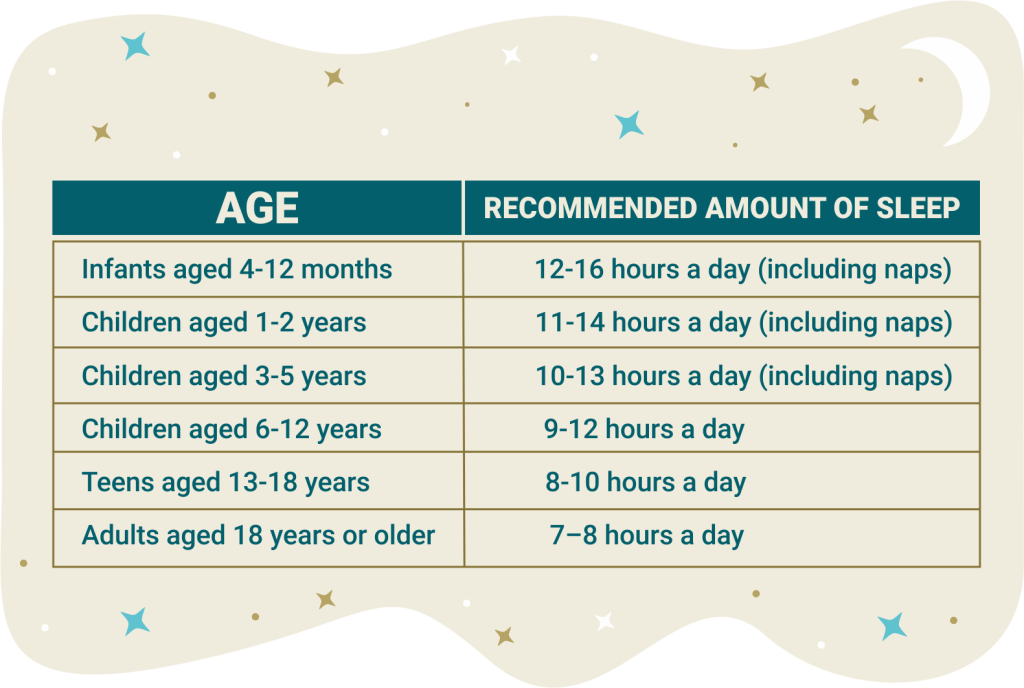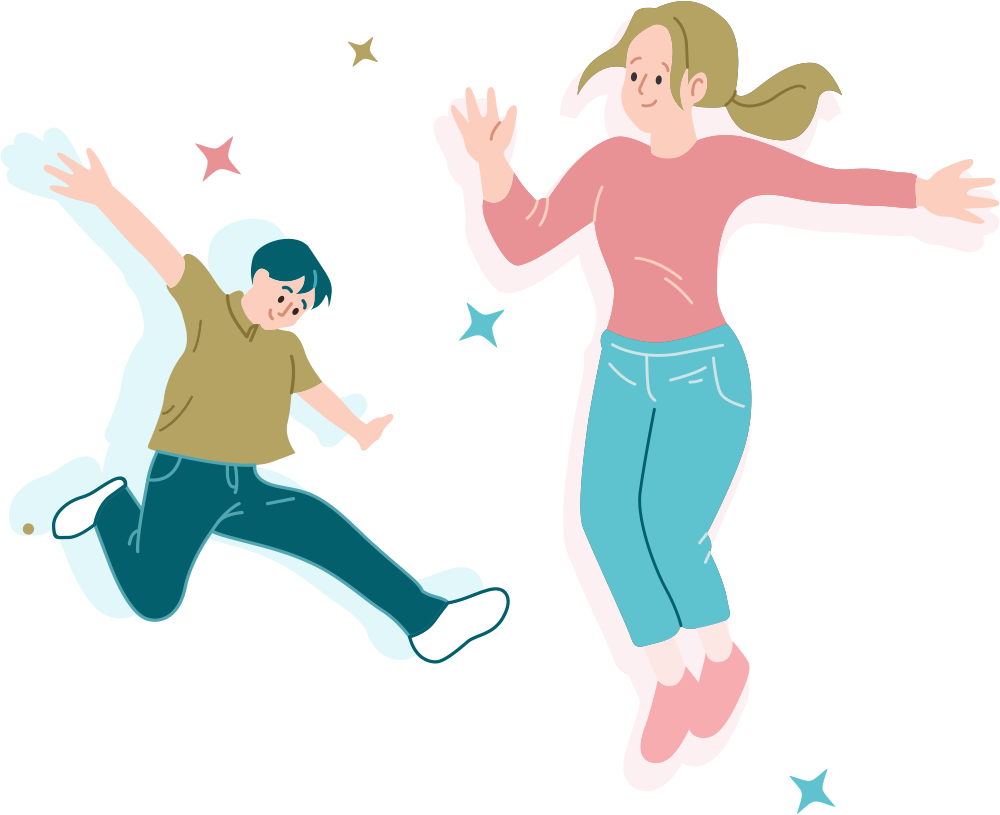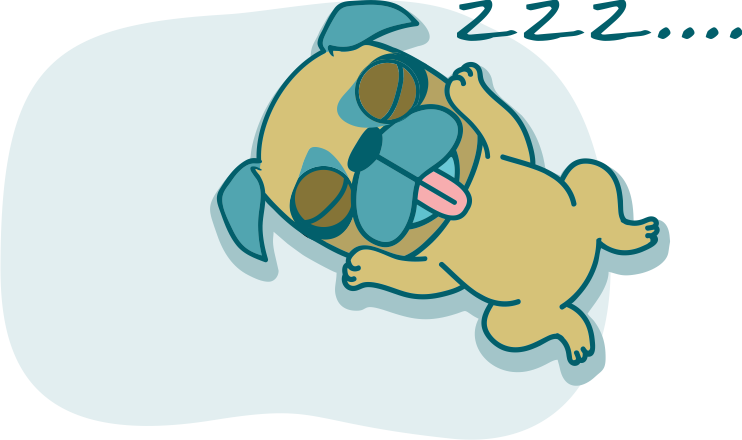How will sleep or lack of sleep affect athletic and academic performance in teenage athletes? Are your children currently getting the right amount and quality sleep? Find the answers in this article…

How Much Sleep Does Teenage Athletes Need?
When we think of a healthy lifestyle we often consider the importance of a healthy diet and exercise routine. We make New Year’s resolutions to eat healthier or exercise more. But, when was the last time you heard someone say their New Year’s resolution was to get more sleep?
Diet and exercise are certainly important for physical health, but sleep is just as important. Sleep helps regulate almost all of our bodily functions including brain function, healing and repairing blood cells, balancing hormones, regulating the immune system, promoting emotional well-being and more.
Likewise, on-going sleep deficiency has been linked to chronic health problems like obesity, heart disease, kidney disease, high blood pressure, diabetes, and stroke. It can also affect how well we think, react, work, learn, and get along with others.
Sleep deprived kids and teenagers experience similar symptoms, but for them, these symptoms can leads to poor grades, poor sports performance, social anxiety, and even more stress than they already experience. Even more importantly, sleep deprivation can negatively impact your child’s growth and development.
According to a survey by the Center for Disease Control and Prevention (CDC), only 28% of high school students were getting enough sleep in 2015. Is your child one of the 72% of teenagers who aren’t sleeping enough?
In this chapter, you’ll learn how much your child should be sleeping and why most children and teens aren’t getting enough sleep. You’ll also learn how sleep can affect your child’s academic and athletic performance. Finally, we’ll talk about some ways to improve your child’s sleep quality.
Teenagers experience a lot of stress in their daily lives as they try to balance school, sports, friends, family, and other responsibilities. Hopefully, by the end of this chapter, you’ll have enough material to convince them that prioritizing their sleep can benefit them in all areas of their busy lives.
Are your children sleeping enough?
The table below represents sleep recommendations from the American Academy of Sleep Medicine (AASM) based on age.
According to the AASM, children need nine to twelve hours of sleep per night and teenagers need eight to ten hours of sleep per night to support their growth and development. According to a survey by the Center for Disease Control and Prevention (CDC), 72.7% of high school students and 57.8% of middle school students were sleep deprived in 2015.
GenYOUth worked in partnership with Sleep Number and in counsel with Edelman Intelligence to survey teens about their sleeping habits. They wanted to learn more about exactly why teenagers are so sleep deprived to be able to offer solutions to what the CDC is calling a “public health epidemic.”

They found that long days and busy schedules could be the main reason why teenagers aren’t getting enough sleep. On average, high school students put in 60 hours a week on school, homework, and extracurricular activities. While students seem to recognize the importance of sleep, they report that they simply don’t have enough time to balance their to-do lists with their social lives and still get the required amount of sleep per night. Based on that answer, it seems like sleep simply isn’t a priority for teenagers. But 67% of teens who participated in GenYOUth’s survey said that they do prioritize sleep, and maybe they do, just after they’ve finished everything else on their to-do lists.
GenYOUth concluded that it’s our job as parents, educators, and family, to “encourage the youth around us to manage their time properly, to find a calming bedtime routine, and to not put too much on their plate.”
Teenagers are under a tremendous amount of stress to perform – academically, athletically, socially, etc. If your child knew just how much sleep can impact their grades, athletic performance, and social lives, would they make sleep a priority?
How sleep affects academic performance

It’s widely accepted that sleep is absolutely essential for brain function. Many studies have found that children and teenagers who get enough sleep score higher on academic tests. That’s because sleep supports all the brain functions that contribute to working memory, long-term memory, problem-solving skills, and even creativity. Let’s take a look at how these functions contribute to academic performance and how sleep affects them.
Working memory
Working memory, or short-term memory, is what helps us remember information for a span of 18 to 30 seconds. It’s extremely important for learning and even more important for testing.
Understood.org provides a great definition of working memory – “Working memory is what helps kids hold on to information long enough to use it.”
Imagine a teacher reads a word problem in math class. Kids need to be able to keep all the numbers in their head, figure out what operation to use and create a written math problem at the same time. Kids with weak working memory skills have difficulty grabbing and holding on to that incoming information. This means they have less material to work with when they’re performing a task. – Understood.org.
Working memory contributes to the speed at which children can process the information presented to them in reading passages or word problems. Since students are almost always expected to finish their exams within a certain amount of time, working memory and a quick processing speed is essential to their success on exams, especially math and reading exams.
Researchers have found that sleep deprivation can impair working memory in terms of processing speed, concentration on the task, and task switching. In one study, two groups of students were asked to recognize digits displayed on a screen by typing them on a keypad. One group of students was only allowed to sleep for four hours a night. The other group was allowed to sleep for eight hours. The students who slept less were 58% slower than the students who slept more.
Sleep, and enough of it, is essential for a fully functioning working memory.
Long-term memory
Long-term memory helps us remember information for longer than 18 – 30 seconds and is absolutely essential for learning – especially for subjects like science and history. On science and history exams, students rely heavily on their long-term memory to recall and recount the information they’re taught in class.
Scientists generally agree that sleep plays an essential role in consolidating important short-term memories and storing them as long-term memories. During deep sleep (stage 3), the short-term memories formed during day are redistributed from the hippocampus to the neo-cortex where they’ll be stored as long-term memories.
Any information your child learns in history class doesn’t really make its way to their long-term memory until they get some shut-eye. Next time your child is up late studying for an exam and struggling to remember everything they’ve learned in class, let them know that getting a good night’s sleep can help them remember all those dates and facts.
Creativity and Problem Solving
Many people report feeling their most creative and productive right after waking up. It turns out that sleep plays an important role in our ability to think creatively and solve complex problems.
Researchers have found that sufficient REM sleep is particularly important for creativity and that remembering dreams can also help with creativity. In terms of creative problem solving, they’ve found that an “incubation period” (time spent not thinking about the problem) can be very helpful.
This incubation period is especially helpful when it includes some sleep time. After sleeping, we’re more likely to make connections among generally dissimilar ideas and facts. This is because the waking brain is sometimes too focused on finding the solution to let the mind wander down unique paths that may lead to the solution in a more creative and round-about way.
But sleep doesn’t just help us solve complex problems in our waking life. We can actually solve these problems WHILE we sleep. In 1993, Harvard tested the effects of dream incubation for problem solving. They found that when students asked themselves a question before bed, half of them dreamt about the issue, and a quarter found a solution in their dreams.
Next time your child is struggling to solve advanced topics in math or they’re stuck on a difficult logic problem, tell them to take a break or take a nap. Better yet, tell them to sleep on it. Sleeping can really help.
How sleep affects athletic performance
Sleep is extremely important for athletes and it’s pretty obvious why. Sports require a lot of physical energy, and sleep is one of the best ways that we restore our energy levels. Athletes who sleep more experience more than just better overall well-being and increased energy, they also benefit from shorter reaction times, reduced risks of injury, better accuracy, faster speeds, and a stronger mental game. Going to sleep early could be one of the best decisions for your child’s athletic success.
Improved reaction times

Reaction time is essential for almost all athletes. Most sports require athletes to make split second decisions and react quickly to events as they unfold. For sports like soccer, basketball, football, and volleyball, players are constantly reacting to their team’s positioning, the positioning of the opposing team, passes, shots, and any and all other movements. Martial arts like boxing, Muay Thai, and Jujitsu require athletes to react quickly to the movements and decisions of their opponent. Even sprinters and swimmers need to react quickly to the starting pistol to get a good start in the race.
In 2017, researchers tested the effects of sleep deprivation on reaction times using a ruler drop test. Participants in the normal sleep group got between seven and ten hours of sleep the night before the test. Participants in the sleep deprivation group got less than an hour of sleep. The scientists measured reaction times by dropping the ruler between the participants’ hands and measuring how long it took the participants to react to the drop and catch the ruler. The sleep deprived group took longer to react to the dropping ruler.
Other studies like this one from the University of Texas at Austin demonstrate the effects of sleep deprivation on split-second decision-making skills. Researchers split 49 West Point cadets into two groups – 21 were deprived of sleep, and 28 were well-rested. Then, the tested the cadets’ ability to make decisions quickly and accurately. Participants in each group performed the each task twice, separated by a 24-hour period. Cadets who were sleep-deprived between testing periods were 2.4 percent less accurate after the 24-hour period. Cadets who were well-rested improved their scores by 4.3 percent.
Both studies demonstrate the importance of sleep for better reaction times and decision-making skills. Whether your child is a soccer player, a swimmer, or Ping-Pong world champion, the ability to react quickly and make split-second decisions will be essential to their success.
Reduced injury rates
Youth sports injury rates are at an all-time high. The number of serious shoulder and elbow injuries among youth baseball and softball players, for example, is five times higher than it was in the year 2000. Many experts and organizations attribute this increase to longer practice hours, early sport specialization, improper equipment, and bad form while training. But, sleep deprivation is another leading cause of youth sports injuries, and the importance of sleep in protecting children against sports injuries is often overlooked.
Let’s go back to the point about reaction times. We already know that sleep deprivation leads to slower reactions and slower decision-making. Well, athletes often need quick reaction times to protect themselves from a bat or a ball or a stick to the face. If your child plays any kind of sport where they could be in danger of these types of mishaps, you’ll want them to get enough sleep so they’ll be able to react quickly and protect themselves.
Secondly, sleep deprivation can affect your child’s immune system making them more likely to get sick. During sleep, your child’s body produces hormones, proteins, and chemicals that they need to fight off diseases and infections. If they don’t sleep enough, their bodies won’t be able to make enough of these substances to protect them. Sleep deprivation can make your child more susceptible to new viruses and bacteria they encounter. If your child isn’t prioritizing sleep, they could get sick which means they’ll probably fall behind in their studies and spend a couple days on the bench while they recover.
Better accuracy/faster speeds
The studies above discuss how lack of sleep can hurt sports performance. Sleep deprived athletes experience slower reaction times and weaker immune systems which could lead to more sports injuries and more time recovering from them. But what happens when athletes sleep more than they normally would?
Researchers tested this idea on collegiate basketball players and found that when players slept for as long as they could for five to seven weeks (ten hours per night as the goal), their performance improved across many categories. They sprinted faster, and their shooting accuracy improved in both free throws and three pointers. They also reported feeling better both mentally and physically during games and practices.
When the study was over, the basketball players acknowledged that they had underestimated the amount of sleep they really needed to perform up to their potential both physically and mentally. Furthermore, they reported that sleeping extra hours did not keep them from completing their typical personal, work, and training activities and obligations. This means that sleeping for ten hours per night is not an unreasonable goal for your child.
Sleep is extremely important for your child to perform up to their potential. If you let them know that sleeping more could make them faster and more accurate, maybe they’ll be more willing to prioritize sleep.
Improving sleep quality

How well your child is sleeping is just as important as how much they’re sleeping. If your child goes to sleep early but has trouble falling asleep or staying asleep, they’ll experience the same negative effects of going to sleep late.
According to a report published in Sleep Health, quality sleep is defined by:
• Sleeping for at least 85 percent of the total time you’re in bed
• Falling asleep in 30 minutes or less
• Waking up no more than once per night; and
• Being awake for 20 minutes or less after initially falling asleep.
If your child has trouble falling asleep or wakes up often throughout the night, here are a couple tips for improving their sleep quality:
• Create a sleep schedule – Irregular sleep patterns can alter your child’s circadian rhythm (internal body clock) and levels of melatonin, which signal their brains to sleep. Setting a sleep schedule is a great way to help set your child’s internal clock so they’re sleepy at the same time every night.
• Reduce screen time at night – Screens emit blue light. When your child spends too much time exposed to blue light in the evening, their brains are tricked into thinking that it’s daytime which stops their brains from producing melatonin and negatively affects their sleep quality.
See here to learn more about setting parental control limits on your child’s smart devices.
• Set their bedroom temperature at 70°F (21°C) – Many studies have found that warmer body and bedroom temperatures can hurt sleep quality and increase wakefulness. Around 70°F (21°C) is ideal for most people but everyone has their own unique preferences. Try to make sure your child is comfortable with the temperature of their bedroom to optimize their sleep quality.
• Eliminate noise and light in their bedroom – External noise like street traffic or the television in other rooms of the house can disturb your child’s sleep. If the noise is evitable, consider buying your child some earplugs. Too much light can also disturb their sleep. Alarm clocks and chargers often have blinking lights that can interfere with sleep. If street lights are an issue, consider buying some blackout curtains.
Children and teenagers have busy lives and are under a lot of pressure to perform both academically and athletically. To make time for homework, sports, and other extracurricular activities, they often cut back on sleep. But sleep is extremely important for them to perform up to their potential both athletically and academically. It’s about time we start teaching our children about the importance of sleep and how to prioritize it.
Children and teenagers have busy lives and are under a lot of pressure to perform both academically and athletically. To make time for homework, sports, and other extracurricular activities, they often cut back on sleep. But sleep is extremely important for them to perform up to their potential both athletically and academically. It’s about time we start teaching our children about the importance of sleep and how to prioritize it.


